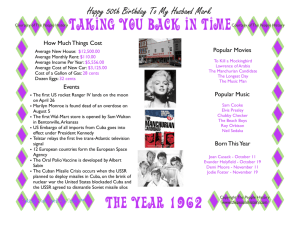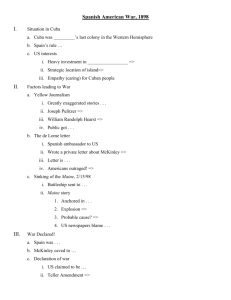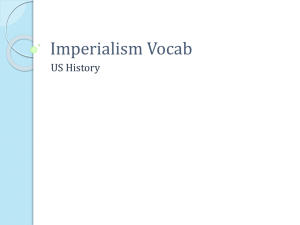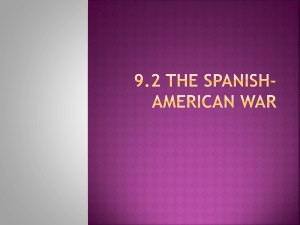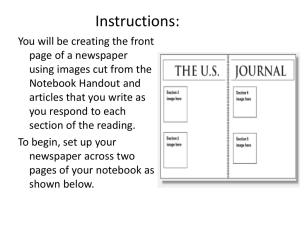www.XtremePapers.com
advertisement
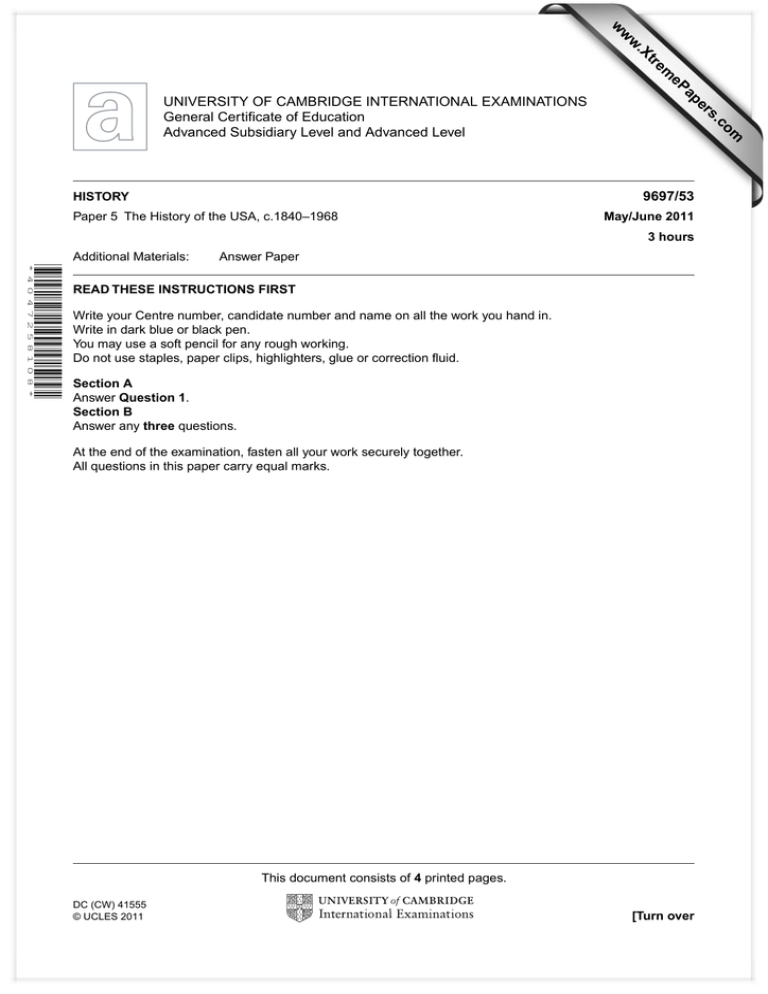
w w ap eP m e tr .X w om .c s er UNIVERSITY OF CAMBRIDGE INTERNATIONAL EXAMINATIONS General Certificate of Education Advanced Subsidiary Level and Advanced Level 9697/53 HISTORY Paper 5 The History of the USA, c.1840–1968 May/June 2011 3 hours Additional Materials: Answer Paper * 4 0 4 7 2 5 8 1 0 8 * READ THESE INSTRUCTIONS FIRST Write your Centre number, candidate number and name on all the work you hand in. Write in dark blue or black pen. You may use a soft pencil for any rough working. Do not use staples, paper clips, highlighters, glue or correction fluid. Section A Answer Question 1. Section B Answer any three questions. At the end of the examination, fasten all your work securely together. All questions in this paper carry equal marks. This document consists of 4 printed pages. DC (CW) 41555 © UCLES 2011 [Turn over 2 Section A: The Road to Secession and Civil War, 1846–1861 You must answer Question 1. THE CONTROVERSY OVER WHETHER THE UNITED STATES SHOULD ACQUIRE CUBA AS A SLAVE STATE, 1851–1860 1 Read the Sources and then answer the question. When answering Question 1, candidates are advised to pay particular attention to the evaluation of the Sources both individually and as a group. Source A It is clear that the annexation of the island of Cuba by the United States is regarded by the great mass of the people as certain. If we are to have Cuba, let us buy it for we do not need it at the cost of war. However let us urge caution. It is desired by Southern States because this would restore the equilibrium of slave and free states in the Union and the Senate. But the North will resist this proposal for the same reason. In our opinion, not a single Northern or Western State would vote for the acquisition and admission of Cuba as a Slave State. There is no overwhelming necessity for acquiring Cuba. We are rich enough, strong enough, prosperous enough, without it. New York Times, 7 October 1851. Source B We are convinced that an immediate effort ought to be made by the government of the United States to purchase Cuba from Spain. It must be clear that, from its geographical position, Cuba is as necessary to the North American republic as any of its present members, and that it belongs naturally to the United States. If Spain, actuated by stubborn pride, and against its own interests, should refuse to sell Cuba then the question will arise: what ought to be the policy of the American government? After we have offered Spain a very generous price for Cuba and this has been refused, it will then be time to consider the question: does Cuba, in the possession of Spain, endanger the internal peace and existence of our cherished Union? If so, then by every law, human and divine, we shall be justified in wresting it from Spain if we possess the power to do so; just as an individual is justified in tearing down the burning house of his neighbour if there were no other means of preventing the flames from destroying his own home. The Ostend Manifesto, 18 October 1854 (Pierre Soule, US Minister to Spain, P F Y Mason, US Minister to France, James Buchanan, US Minister to Britain). © UCLES 2011 9697/53/M/J/11 3 Source C Whereas the geographical position of Cuba invests it with a commanding influence over the large and increasing trade, foreign and coastwise, of the Mississippi valley; and whereas that Cuba in its existing colonial condition and closeness to the United States, must continue a constant source of injury and annoyance which endanger friendly relations between Spain and the United States. Accordingly in the opinions of Congress and of the President of the United States, as to the best means of settling the existing difficulties and of removing all causes of future disturbances between the two countries, it is expedient that negotiations for the purchase of Cuba should be renewed. From a Bill to facilitate the acquisition of Cuba by negotiation in the name of Senator Slidell, 17 January 1859. Source D The President has recommended the acquisition of Cuba by negotiation with Spain, but adding that circumstances may arise which will justify its acquisition in some other manner. It is said that Cuba naturally belongs to us on account of its position. After we get Cuba this same claim can be used to acquire Jamaica which is 90 miles from Cuba, while Cuba is 130 miles from our coast, and so on until we add all the West Indies to our possession, and then when there are no more islands to purchase or conquer, the discovery will be made that Mexico naturally belongs to us, and then when we have acquired Mexico it will be argued that we have a natural right to all the Central American States. And last of all, Canada will be brought within the operation of this argument and after that surely, the Russian possession of Alaska. Speech by the Honorable H E Royce of Vermont to the House of Representatives, 15 February 1859. Source E In 1854 a former Mississippi Governor planned an unofficial military expedition to seize Cuba from Spain. President Pierce may have encouraged him but then forced him to abandon the expedition when faced with intense opposition from anti-slavery Northerners who saw this as yet another example of the ‘Slave Power’, the conspiracy of slave holders and their Northern dupes to gain more territory for slavery. However, events slipped out of Pierce’s control. In October 1854 the American ambassadors to Britain, France and Spain met at Ostend and issued an unofficial manifesto calling on the United States to acquire Cuba by any means including force if necessary. The ensuing storm of criticism caused Pierce to reject the manifesto. However, the advocates of slavery expansion had stirred enough commotion to arouse fears in anti-slavery Northerners, that the South was conspiring to establish a Caribbean slave empire. Throughout the 1850s this was a constant anxiety to the opponents of slavery expansion. A modern US historian’s account of the background to the secession crisis of 1860-61. Now answer the following question. ‘The arguments put forward in favour of the United States acquiring Cuba were reasonable.’ Using Sources A–E, discuss how far the evidence supports this assertion. © UCLES 2011 9697/53/M/J/11 [Turn over 4 Section B You must answer three questions from this section. 2 Why was it that the 1850 Compromise had started to unravel by 1856? 3 ‘Divided by Civil War, but united by the experience of Reconstruction.’ Consider this verdict on white Southerners. 4 Account for the rise of giant corporations in the period 1870–1914. 5 ‘Without the Supreme Court’s favourable decisions, the advances made by the civil rights movement in the 1950s and 1960s would not have been possible.’ How far do you agree with this judgement? 6 How accurate is it to represent the New Deal as a ‘political revolution’? 7 Why and how did the United States become involved in the Second World War? 8 ‘The 1950s were deeply conformist, but by 1968 unwillingness to conform had become both fashionable and acceptable.’ How valid is this assertion? Copyright Acknowledgements: Question 1 Source E © Boyer et al; The Enduring Vision: A History of the American People; Houghton Mifflin; 2005. Permission to reproduce items where third-party owned material protected by copyright is included has been sought and cleared where possible. Every reasonable effort has been made by the publisher (UCLES) to trace copyright holders, but if any items requiring clearance have unwittingly been included, the publisher will be pleased to make amends at the earliest possible opportunity. University of Cambridge International Examinations is part of the Cambridge Assessment Group. Cambridge Assessment is the brand name of University of Cambridge Local Examinations Syndicate (UCLES), which is itself a department of the University of Cambridge. © UCLES 2011 9697/53/M/J/11
